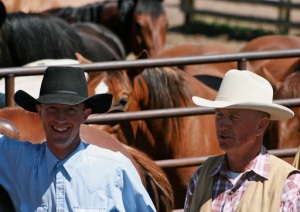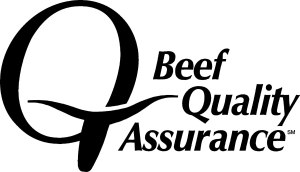 Quality beef comes from cattle who are well cared for and raised with a strong code of ethics and values. Ranchers providing that care are passionate and dedicated in what they do. Despite some reports from activists groups who use online forums to promote mistreatment of animals and solicit fund raising for their programs, cattle ranchers across the country devote significant time and resources to ensuring their livestock are cared for properly.
Quality beef comes from cattle who are well cared for and raised with a strong code of ethics and values. Ranchers providing that care are passionate and dedicated in what they do. Despite some reports from activists groups who use online forums to promote mistreatment of animals and solicit fund raising for their programs, cattle ranchers across the country devote significant time and resources to ensuring their livestock are cared for properly.
Beginning in the 1970s, cattle producers began to develop programs to evaluate, measure and ensure quality care for livestock and a safe beef supply. Today, that program has developed into the Beef Quality Assurance Program with guiding principles to establish standards for animal care.
- WE BELIEVE production practices affect consumer acceptance of beef.
- WE BELIEVE the BQA Program has and must continue to empower beef producers to improve the safety and wholesomeness of beef.
- WE BELIEVE these fundamental principles are the fabricoftheBQA Program.
- Empowering people…because producers can make a difference.
- Taking responsibility…because it’s our job, not someone else’s.
- Working together…because product safety and wholesomeness is everyone’s business.

Cattle ranchers take pride in their responsibility to raising cattle, taking care of their land, and being good stewards of their resources. To suggest ranchers lack the proper values in raising safe, quality food, would be misleading. Thousands of cattle ranchers across the country participate in the Beef Quality Assurance programs which outline a Code of Cattle Care to ensure proper care and handling of livestock:
- Provide necessary food, water and care to protect the health and well-being of animals.
- Provide disease prevention practices to protect herd health, including access to veterinary care.
- Provide facilities that allow safe, humane, and efficient movement and/or restraint of cattle.
- Use appropriate methods to humanely euthanize terminally sick or injured livestock and dispose of them properly.
- Provide personnel with training/experience to properly handle and care for cattle.
- Make timely observations of cattle to ensure basic needs are being met.
- Minimize stress when transporting cattle.
- Keep updated on advancements and changes in the industry to make decisions based upon sound production practices and consideration for animal well-being.
- Persons who willfully mistreat animals will not be tolerated.
Want to hear from some of these ranchers? Take time to view interviews with Montana ranchers as they discuss their dedication to the livestock and the lifestyle by visiting our YouTube channel.
The Beef Quality Assurance Program outlines the minimum expectations of ranchers for cattle care and handling. To learn more about the program, visit BQA.org or contact your state’s coordinator. Learn more about Montana’s BQA program by visiting their Facebook page or by contacting Bill Pelton at (406) 671-5100 or by email at [email protected].
What questions do you have about Beef Quality Assurance? Leave a comment below or email [email protected]. This is part of a month-long series of 10 Things to Know about Cattle. To read other posts in the series, click the image below.

Click this image to view all posts in the 30-day blogging series, 10 Things to Know About Cattle
 Beef Checkoff dollars help fund the Montana Beef Quality Assurance (BQA) program that provides critical guidelines for safe and humane beef cattle production. Each year it becomes more important for all stakeholders to learn best management techniques in a continuing effort to build and maintain consumer confidence in our product. BQA is a voluntary commitment from responsible producers because it is the right thing to do!
Beef Checkoff dollars help fund the Montana Beef Quality Assurance (BQA) program that provides critical guidelines for safe and humane beef cattle production. Each year it becomes more important for all stakeholders to learn best management techniques in a continuing effort to build and maintain consumer confidence in our product. BQA is a voluntary commitment from responsible producers because it is the right thing to do! Checkoff dollars help spread the message and tell our story throughout the state of Montana. In 2014 we told the BQA story across the state to rancher-attended seminars and conventions, livestock auction barn audiences, 4-H Clubs, FFA Chapters and Conventions, VoAg Instructor groups, Facebook posts and email news blasts to greatly increase the numbers of Montana stakeholders registering for and completing online BQA certification.
Checkoff dollars help spread the message and tell our story throughout the state of Montana. In 2014 we told the BQA story across the state to rancher-attended seminars and conventions, livestock auction barn audiences, 4-H Clubs, FFA Chapters and Conventions, VoAg Instructor groups, Facebook posts and email news blasts to greatly increase the numbers of Montana stakeholders registering for and completing online BQA certification.



